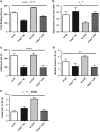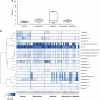Inflammasome signaling affects anxiety- and depressive-like behavior and gut microbiome composition
- PMID: 27090302
- PMCID: PMC4879188
- DOI: 10.1038/mp.2016.46
Inflammasome signaling affects anxiety- and depressive-like behavior and gut microbiome composition
Abstract
The inflammasome is hypothesized to be a key mediator of the response to physiological and psychological stressors, and its dysregulation may be implicated in major depressive disorder. Inflammasome activation causes the maturation of caspase-1 and activation of interleukin (IL)-1β and IL-18, two proinflammatory cytokines involved in neuroimmunomodulation, neuroinflammation and neurodegeneration. In this study, C57BL/6 mice with genetic deficiency or pharmacological inhibition of caspase-1 were screened for anxiety- and depressive-like behaviors, and locomotion at baseline and after chronic stress. We found that genetic deficiency of caspase-1 decreased depressive- and anxiety-like behaviors, and conversely increased locomotor activity and skills. Caspase-1 deficiency also prevented the exacerbation of depressive-like behaviors following chronic stress. Furthermore, pharmacological caspase-1 antagonism with minocycline ameliorated stress-induced depressive-like behavior in wild-type mice. Interestingly, chronic stress or pharmacological inhibition of caspase-1 per se altered the fecal microbiome in a very similar manner. When stressed mice were treated with minocycline, the observed gut microbiota changes included increase in relative abundance of Akkermansia spp. and Blautia spp., which are compatible with beneficial effects of attenuated inflammation and rebalance of gut microbiota, respectively, and the increment in Lachnospiracea abundance was consistent with microbiota changes of caspase-1 deficiency. Our results suggest that the protective effect of caspase-1 inhibition involves the modulation of the relationship between stress and gut microbiota composition, and establishes the basis for a gut microbiota-inflammasome-brain axis, whereby the gut microbiota via inflammasome signaling modulate pathways that will alter brain function, and affect depressive- and anxiety-like behaviors. Our data also suggest that further elucidation of the gut microbiota-inflammasome-brain axis may offer novel therapeutic targets for psychiatric disorders.
Figures





References
-
- Leonard B, Maes M. Mechanistic explanations how cell-mediated immune activation, inflammation and oxidative and nitrosative stress pathways and their sequels and concomitants play a role in the pathophysiology of unipolar depression. Neurosci Biobehav Rev 2012; 36: 764–785. - PubMed
-
- Licinio J, Wong ML. The role of inflammatory mediators in the biology of major depression: central nervous system cytokines modulate the biological substrate of depressive symptoms, regulate stress-responsive systems, and contribute to neurotoxicity and neuroprotection. Mol Psychiatry 1999; 4: 317–327. - PubMed
-
- Mikova O, Yakimova R, Bosmans E, Kenis G, Maes M. Increased serum tumor necrosis factor alpha concentrations in major depression and multiple sclerosis. Eur Neuropsychopharmacol 2001; 11: 203–208. - PubMed
-
- Kokai M, Kashiwamura S, Okamura H, Ohara K, Morita Y. Plasma interleukin-18 levels in patients with psychiatric disorders. J Immunother 2002; 25(Suppl 1): S68–S71. - PubMed
Publication types
MeSH terms
Substances
LinkOut - more resources
Full Text Sources
Other Literature Sources
Medical
Miscellaneous

